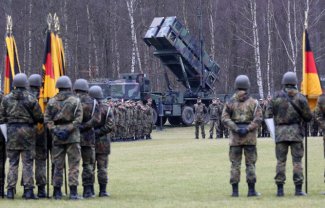Germany’s defence budget – more rhetoric than money

On 2nd May the German federal government adopted a draft budget and a financial plan for 2018–2022. The draft lays out a defence budget of 41.54 billion euros in 2019, which is 3 billion euros more than last year. In the financial plans for the following years it is stated that this level of funding will be maintained and increased slightly to 42.68 billion euros in 2022 (see Appendix). The share of the expenditure on investment in arms and military equipment in the 2019 budget will be increased to 18.3%; however, in the following years it will fall to reach 10% in 2022. The German defence budget will amount to 1.3% of the country’s GDP in 2019; this percentage will however drop to 1.2% in 2022 despite a slight nominal increase in funding – due to projected economic growth in Germany.
The German government’s plans for funding the Bundeswehr in the following four years are far behind the political commitments which Berlin agreed to at the NATO summit in Wales in 2014. They detailed increasing the defence budget to 2% by 2024, with 20% of it to be spent on investments yearly.
On 15th May, the first reading of the draft budget began in the Bundestag. The level of the planned funding for the defence budget caused heated controversy in the parliamentary debate and discussions in the media. It cannot be ruled out that amendments will be made in the draft regarding the level of the Bundeswehr’s funding. The Bundestag is likely to adopt the budget law this autumn.
Commentary
- The current plans and the ongoing discussion about the level of funding for the German armed forces until 2022 are important for Germany’s credibility in NATO and within the common EU security and defence policy. Berlin presents itself as the EU’s leader in the area of consolidating NATO’s eastern flank and developing, with France, ‘strategic autonomy’ of the EU in security and defence policy. The present plans for the budget indicate that Germany’s ambitions are not matched with adequate funding of the German armed forces. The issue of the defence expenditure of the European allies and the trans-Atlantic ‘burden sharing’ will be one of the main topics to be discussed at the NATO summit to be held in Brussels in July this year. If the present plans of financing the Bundeswehr are maintained, the NATO summit in Brussels may become an arena of disputes between the US and Germany, bearing in mind that President Donald Trump regularly criticises Germany for insufficient defence spending.
- The dispute over Germany’s defence spending does not even concern the mythical level of 2% of GDP which Germany could only attain by almost doubling its current defence budget. It is rather focused on the Bundeswehr spending sufficient amounts of funding on the Bundeswehr’s present needs, such as the salaries of the military personnel, infrastructure, arms and military equipment. In recent years the German armed forces were slowly disarming due to the cuts which had been underway since 2011. This included the withdrawal from service of used military equipment in all branches of the armed forces, the limiting of the purchase of spare parts for equipment still in service and the limiting of the availability of military equipment to 50-70% in subdivisions of the ground forces. The poor condition of the Bundeswehr can be illustrated by the difficulties in deploying a fully equipped brigade of the ground forces as part of the German participation in the NATO’s Very High Readiness Joint Task Force (VJTF) in 2019.
- Due to the EU and NATO commitments and the resulting need to improve the equipment and operational readiness of the Bundeswehr as well as the implementation of new armament programmes, the German defence ministry has applied for an additional f 12 billion euros for 2019–2022. In line with the draft defence budget and a multiannual financial plan that the government has adopted, the defence ministry will receive only 3.5 billion euros more compared to the 2017 plans and the annual increase in defence budgets will amount to 4.2 billion euros in total. According to German analysts, with the planned funding at the level of 41-42 billion euros by 2022, the negative trend in the Bundeswehr will not be reversed. The slight increase in the defence budget will be consumed by inflation (approximately 0.5 billion euros a year) and by the planned increase in the number of troops, and hence for their salaries. The expenditure on investments in arms and military equipment is therefore projected to fall rather than grow, which will lead to delays in the implementation of the planned armament programmes. The information about a possible postponement of the implementation of the joint program to purchase submarines in partnership with Norway and a joint programme to purchase C-130 Hercules transport aircraft in partnership with France has appeared in the media. This may also apply to the programme of the TLVS ground-based air defence system.
- The draft budget law for 2019 also defines the framework of the discussion between the coalition partners (the CDU/CSU and the SPD) and the opposition about the defence budget for the following four years of the grand coalition’s rule. The defence minister Ursula von der Leyen (CDU) has opposed the budget plans proposed by the finance minister Olaf Scholz (SPD). At the government meeting during which the draft budget law was adopted, von der Leyen and the minister for economic co-operation and development (CSU) submitted a declaration to the protocol, in which they demanded increased spending on defence and development co-operation. According to the CDU/CSU-SPD coalition agreement signed in February this year an increase in defence expenditure is linked to an increase in the official development assistance spending. Chancellor Angela Merkel supports an increased defence budget, while the SPD is opposed to it as it demands improved effectiveness of defence spending by the defence ministry. The entire opposition (the FDP, the AfD, the Green Party and the Left Party) have also criticised the defence ministry for the ineffectiveness and poor management of armament programmes. However, the FDP is in favour of increased funding for the Bundeswehr in order for Germany to deliver on the commitments made as part of the collective defence and to take part in crisis response operations. The AfD also supports stepping up spending on military purposes to 2% of the country’s GDP in 2025 and focusing the Bundeswehr on the defence of the country and NATO (not crisis response operations). Simultaneously, the AfD does not regard Russia as a challenge and threat to Germany’s security and it criticises NATO presence on its eastern flank. The Green Party is against a further increase in military spending and the Left Party has even demanded it be reduced.
- The controversy surrounding the German defence expenditure is linked above all to the fact that the majority of German society and elites do not feel threatened by Russia or challenged by the crises in North Africa or in the Middle East and that they do not consider the armed forces to be an instrument of conflict prevention and resolution. Greater involvement of the Bundeswehr outside Germany is not linked to a perceived increase in challenges and threats for Germany. It is rather seen as necessary to meet the expectations of Germany’s allies in NATO (the US and the eastern flank states) and the EU (France). Security policy is not among the top priorities of the government’s agenda, and parties such as the CDU/CSU do not want to risk running an offensive pro-defence campaign in the pacifist German society, as they fear they may lose support and be confronted with a counter-offensive from the SPD, the Green Party and the Left. Such a campaign would also be more difficult to mount because it is the CDU/CSU politicians (Franz Josef Jung, Karl-Theodor zu Guttenberg, Thomas de Maizière, Ursula von der Leyen) who since 2005 have been responsible as defence ministers for the cuts in spending and the reforms in the Bundeswehr. Given strong opposition to Donald Trump in the German elites and society, the US administration’s criticism of the German defence budget appears even counter-productive, and unhelpful for German proponents of increasing the defence budget. Stronger public pressure from the EU’s allies and references to Germany’s responsibility in enhancing security on NATO’s eastern flank and Europe’s southern neighbourhood could be the only instruments which might influence the German debate on defence spending.
- The draft budget law will be discussed in the Bundestag until this autumn, and this opens up certain possibilities to move larger funding to the defence budget, even though these possibilities are rather limited. During the Bundeswehr’s symposium on 15 May in Berlin, Ursula von der Leyen announced that in 2025 Germany will allocate 1.5% of its GDP to the Bundeswehr; however, so far her declaration has not been confirmed by the defence funding as currently planned and its implementation timeframe goes beyond the term of the present parliament.
Appendix. The 2019 defence budget and the financial plans for 2020–2022*
|
|
2017 |
2018 |
2019 |
2020 |
2021 |
2022 |
|
51st financial plan for 2017 in euros |
37.00 bn |
38.45 bn |
39.64 bn |
40.91 bn |
42.29 bn |
|
|
52nd financial plan for 2018 in euros
|
|
38.49 bn |
41.54 bn |
41.74 bn |
42.70 bn |
42.68 bn |
|
|
2017 |
2018 |
2019 |
2020 |
2021 |
2022 |
|
Defence budget as percentage of GDP |
1.21% |
1.22% |
1.27% |
1.24% |
1.23% |
1.19% |
|
Share of expenditure on investments in defence budget |
16.2% (6 bn euros) |
16.4% (6.3 bn euros) |
18.3% (7.6 bn euros) |
15.1% (6.3 bn euros) |
13.6% (5.8 bn euros) |
10.1% (4.3 bn euros) |
* Data from the draft federal budget for 2019 and the presentation developed by Professor General Jürgen Schnell from the Bundeswehr University Munich Zum Verteidigungshaushalt im Finanzplan der Bundesregierung für die Jahre 2019-2022 - Vergleiche, Prognosen unie Bewertung, 5 May 2018.




